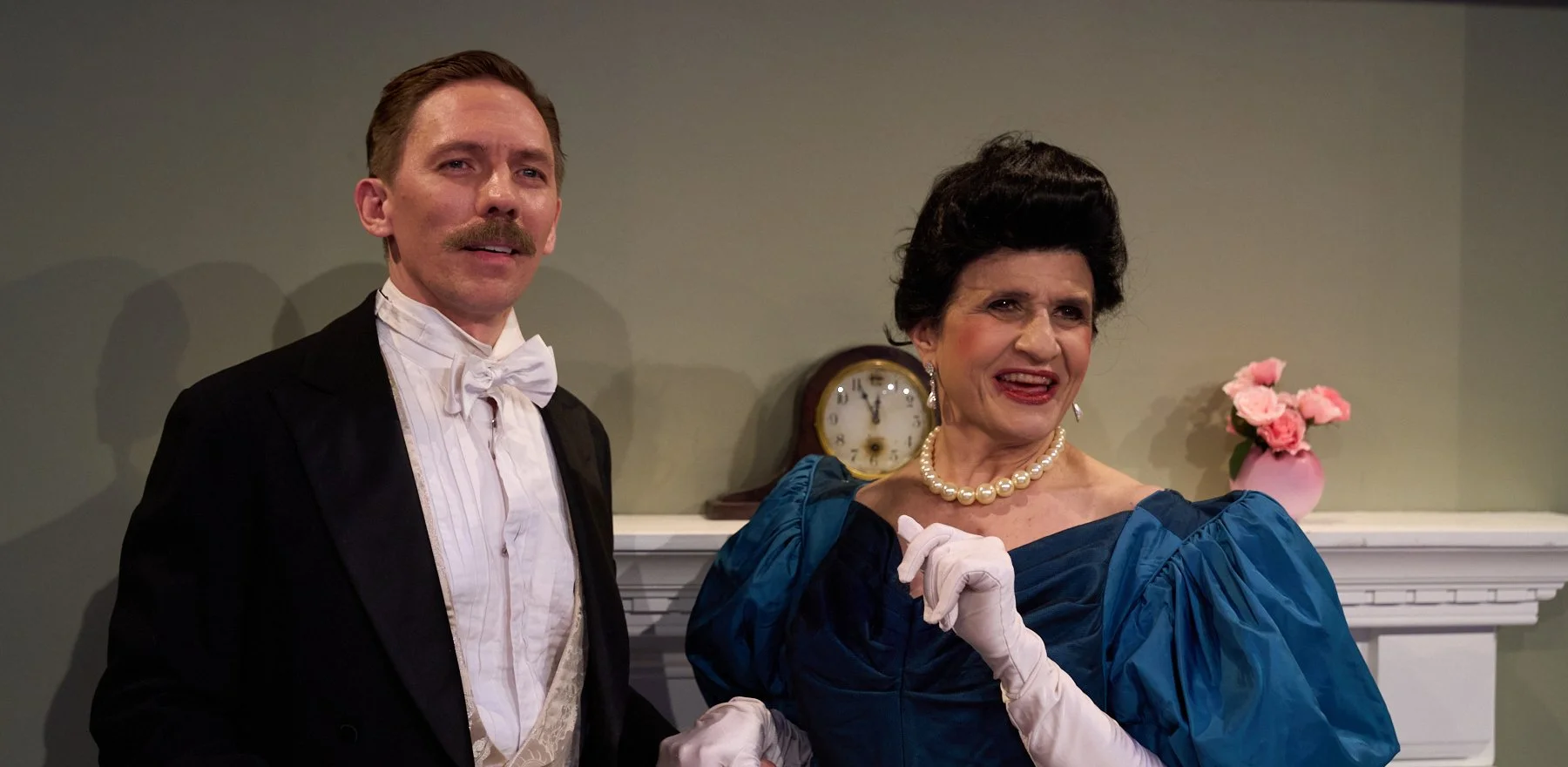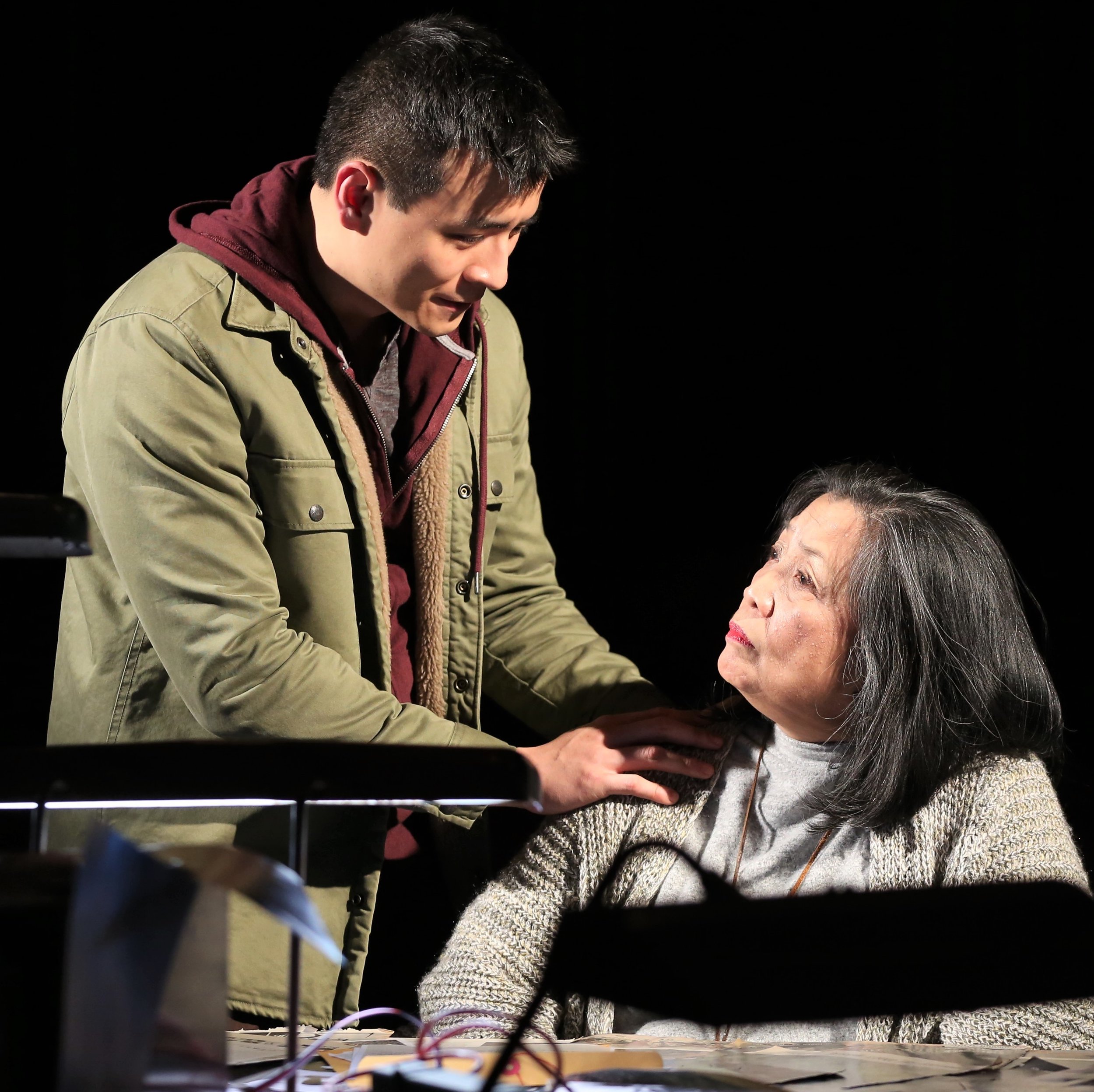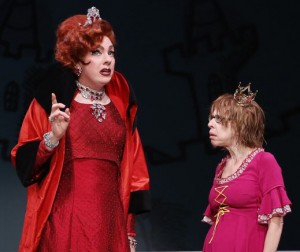On Set with Theda Bara is a single-actor comedy-drama by Joey Merlo that revolves around the suspicious disappearance of a genderqueer teenager. In this pastiche of film noir, Merlo piles mystery upon outlandish mystery, and David Greenspan leads the spectators (limited to 50 a performance) through a 65-minute, mazelike tale that’s at once intriguing and mystifying.
A Delicate Balance
Edward Albee’s 1966 Pulitzer Prize–winning A Delicate Balance begins in the evening and ends in the morning. Hidden terrors emerge and then suddenly disappear in a drama that could be titled Long Night’s Journey into Day. As one character says, “Darkness still frightens us,” and “when the daylight comes again . . . comes order with it.” In Jack Cummings III’s slyly off-kilter production, presented in partnership with Transport Group and the National Asian American Theatre Company, the play begins in total light and ends in complete darkness. The terrors do not dissipate at dawn but linger into a new day.
The Unsinkable Molly Brown
When Dick Scanlan files his taxes, under Occupation, does he put “Richard Morris rewriter”? Morris, a middling mid-century scribe, penned the screenplay for Thoroughly Modern Millie, revised successfully for Broadway by Scanlan in 2002. Now Scanlan has “revitalized,” as the marketing for it goes, The Unsinkable Molly Brown, a 1960 Broadway hit, with a book by Morris, that was Meredith Willson’s follow-up to The Music Man. Scanlan’s Millie, to these eyes at least, was a sloppy rehash of an awkward premise that didn’t know exactly what it wanted to be. (You can judge for yourself when Encores! encores it in May.) But on Willson’s Molly, it turns out, Scanlan has done a bang-up job.
The Trial of the Catonsville Nine
The Trial of the Catonsville Nine, in revival at the Abrons Arts Center, is about the Catholic activists who burned 378 draft records with napalm in Catonsville, Md., in 1968, because “pouring napalm on pieces of paper is preferable to pouring napalm on human beings.” Its author, the Rev. Daniel Berrigan, was a member of the Nine and a lifetime antiwar activist. In his play, Berrigan edits and interweaves excerpts of the trial to build arguments against the Vietnam War and U.S. militarism.
David Huynh and Mia Katigbak in The Trial of the Catonsville Nine. Top: Huynh and Eunic Wong.
Over the course of the trial, the group’s members attempted to draw connections between issues, only to be told, “We are not trying that case.” Berrigan cannily demonstrates how all social and political issues are linked, no matter how much the powers that be might wish it otherwise. There is little self-awareness in this hyperbolic play (which, for example, draws parallels between the U.S., with its involvement in Vietnam, and Nazi Germany) but plenty of fervent belief in its own virtue.
Yet the play engages in its own bit of division by almost entirely removing the point of view of the war’s victims in order to celebrate antiwar activists. With a cast of only Asian-American actors, this production, directed by Transport Group artistic director (and Catonsville native) Jack Cummings III and co-produced by the National Asian American Theatre Company, provides a small corrective to the play’s narrow viewpoint.
Actors David Huynh, Mia Katigbak, and Eunice Wong are generous performers. Their well-rehearsed connectivity overcomes Cummings’s hyperactive staging, which seats the audience on spartan wooden pews around the perimeter of the Abrons stage (the theater’s actual seats are unused) and often pulls the actors to opposite corners of the set to bring them nearer to the viewers.
The performers shift characters and locales quickly to accommodate the verbatim format, as witnesses take turns testifying. Unfortunately, these shifts happen so often that each role is given only the most superficial characterization; there’s no time for the internal tensions and oppositions that make a character interesting. Katigbak is best able to find colors in the characters she plays, while Huynh has been directed to deliver every line at a relentlessly humorous, overbearing pitch.
In this he reflects the production as a whole. From R. Lee Kennedy’s blood-red lights, which bathe the space as the actors enter the theater to the accompaniment of Barry McGuire’s 1960s protest classic “Eve of Destruction,” to sound designer Fan Zhang’s Brian Eno–lite score and omnipresent low rumbles, shaking the pews, the evening is monochromatically morose. The subject matter is undoubtedly solemn, but by denying the pleasure of activism, the full-body thrill when the match strikes the napalm, The Trial of the Catonsville Nine has made the Vietnam War the one thing it was not and theater the one thing it should never be: boring.
Huynh and Wong. Photographs by Carol Rosegg.
The evening’s best theatrical moment comes near the end of the play, when the stage curtain on one side and the loading door on the other side drop quickly, cutting the audience off from the outside and blinding them with white-hot lights. Setting aside the hypocrisy of a production with so little self-awareness daring to interrogate and implicate its paying audience, the moment at least packs a visceral thrill. Yet the thrill dissolves when the curtain rises at the end to reveal the empty auditorium filled with haze and more blinding white lights, into which the actors disappear as though passing through the pearly gates. The angry protest music of the actors’ entrance becomes the New Age-y strains of DJ Drez’s sitar-heavy “India Dub” of “For What It’s Worth” (you know: “Stop, hey, what’s that sound, everybody look what’s going down”), and a benign evening honoring activists blossoms into full-blown, tone-deaf hero worship.
Berrigan’s fawning platitude is little better than the propaganda that implores Americans to honor “the troops.” The truth is, we don’t need any play, ever, and it’s past time that productions like The Trial of the Catonsville Nine, which mistake gravitas for gravity and crocodile tears for emotional heft, stop taking that fact for granted.
The Transport Group and the National Asian American Theatre Company’s production of The Trial of the Catonsville Nine plays through Feb. 23 at Abrons Arts Center (466 Grand St.). Evening performances are at 7:30 p.m. Tuesdays through Saturdays; matinees are at 3 p.m. Sundays. For tickets and information, call OvationTix at (866) 811-4111 or visit transportgroup.org.
Summer and Smoke
Classic Stage Company and Transport Group are taking a fresh look at Tennessee Williams’ Summer and Smoke. Critical estimation of this lyrical drama—the playwright's fourth Broadway outing—has fluctuated since its 1948 premiere. After the original New York presentation, Summer and Smoke seemed destined for obscurity. But Jose Quintero’s 1952 production for Circle in the Square was a triumph and, according to many commentators, marked the birth of Off-Broadway. The current revival, under sure-handed direction by Jack Cummings III, discards the realistic trappings of mid-20th-century American theater and features a nearly ideal cast.
Strange Interlude
Strange Interlude, one of four Eugene O’Neill plays to have won a Pulitzer Prize, is brilliant, magisterial, and provocative. How then, does one actor, David Greenspan, take the complex story of Nina Leeds and the four men in her life, a play that is written in nine acts and spans five hours in the telling, and deliver the highs and the lows, the strange twists of fate, the loves, and the schemes of its characters? Dressed in a dapper three-piece suit, Greenspan is alternately Nina, Charles, Ned and Sam (and three minor characters as well), maintaining an energetic, staccato presence while shifting, sometimes with gunfire rapidity, among these characters. Who would have imagined that this 1928 whale of a play could be acted as a one-man show to riveting effect? Greenspan is extraordinary, and he brings to life an extraordinary play.
The William Inge Plays
Halfway through Picnic, the 1953 William Inge comedy-drama playing at Judson Gym (in repertory with Inge’s Come Back, Little Sheba), a hunky vagabond named Hal fidgets disconsolately while posing for a quick-sketch portrait. When the artist, thwarted by Hal’s restlessness, urges him to relax and be “natural,” Hal laments, “Gee, that’s hard.”

















